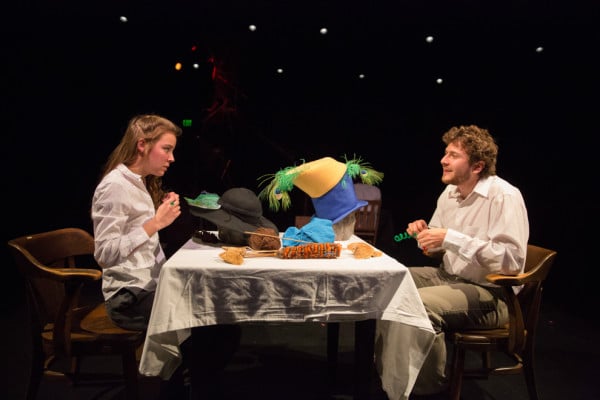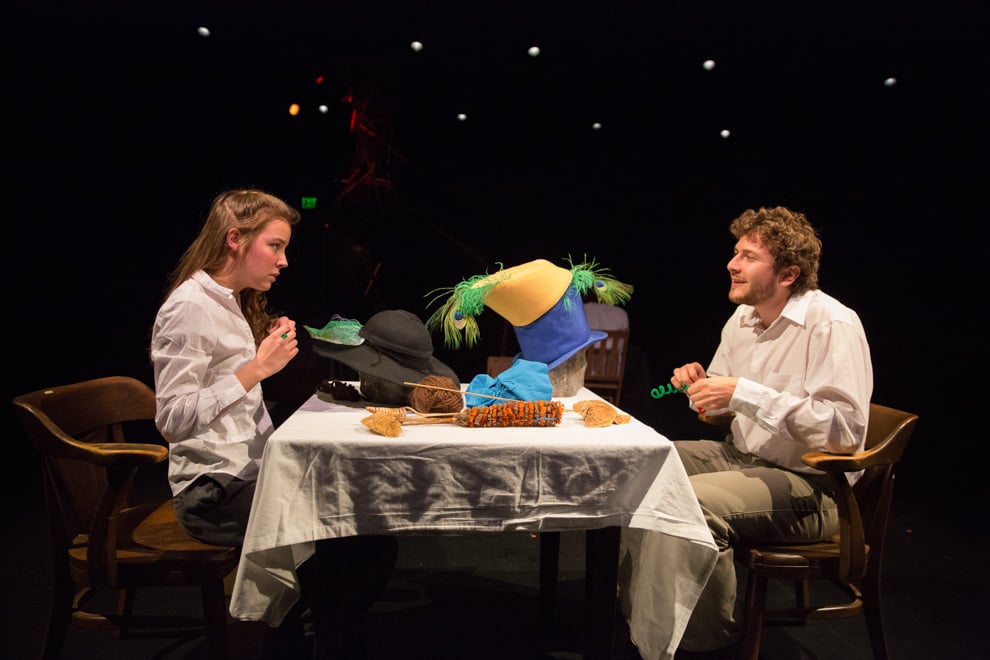
Last Thursday, the TAPS Ph.D. Student Showcase featured “Far Away,” a psychological drama about a young hatmaker, Joan (Lea Zawada ‘18), struggling to find her place in the complex landscape of a world torn by global war. The small, intimate setting of Nitery Theater brought the audience even closer to the hauntingly relevant play. Directed by Vivek Narayan, the production was abstract and lacked definition, but the subject matter and affecting performances by a small cast were thought-provoking and worthwhile.
Zawada’s troubled, expressive eyes captivated as she questioned her aunt — a stoic and quietly powerful MBA candidate Ting Chen as Harper — about why her uncle was herding bloodied prisoners into a lorry in the dead of night. In this initial scene and throughout, Zawada demonstrated complexity as an actress, revealing both strong and vulnerable facets of her character. Through a push-and-pull repartee in which Harper managed to convince her young niece that her uncle was saving the prisoners rather than condemning them, the actresses bounced well off one another. The staging reflected their exchange; they were spaced apart during moments of contention and closer together when Harper took on a comforting, motherly role for scared young Joan. Even with such a small principal cast of three characters, the stage never felt empty.
After this scene, fifteen years passed, which was not clear and was a source of confusion. The director could have inserted simple cues to elucidate this fact. Still, there were distinctions in Zawada’s acting as a child and woman; she seemed to mature throughout the play, another sign of her acting chops. Joan took a job as a hatmaker and met Todd (Victor Spielberg Verdejo ‘15), a fellow milliner with whom she hit it off immediately. Verdejo did a fine job of portraying Todd, convincingly uncertain and a bit bashful, despite his height, yet passionate about hat-making.
In a style reminiscent of “The Hunger Games,” the pair delightedly made extravagant hats for the prisoners of war to wear in a sort of sadistic parade. Limping down the stage in ragged clothes and expressions of glazed pain, bedecked in ludicrously ostentatious hats, the prisoners inspired pity and discomfort in the audience. Even as Joan and Todd gradually became cognizant of the harshness of global war and the negative reality to which their hatmaking contributed, the play raised the question: How can one reconcile opposition to the war with personal interests? In the anti-climactic final scene, the characters discuss this issue at length, but it is all talk. With little action, nothing is accomplished.
The two elements that remained onstage consistently were a sculpture of wooden boards hanging from the ceiling and the sound designer, both of which figured prominently into the overall experience of the play. As the play progressed, the sculpture in the back, initially consisting only of wood, began to feature wire, becoming an abstract fence that symbolized the entrapment of the prisoners. The sound designer largely determined the tone of the play, often opting for disquieting white noise, a buzz that further enhanced the feeling of something not quite right. The unique choice to have the sound designer onstage showed that the knell of devastating war can come into our real lives at any time.
This eerie, moody, and unsettling play is disturbing, to say the least, but the production is to be commended for delving — with gusto and creativity — into the relevant and terrifying potentiality of global war. There are no easy answers to the issues of conflict that we face, but through this play, we realize that maybe attempting to find our own role in the struggle is enough.
Contact Madeline at [email protected].
